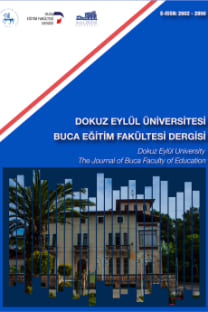MÜZİK ÖĞRETMENİ ADAYLARININ BİREYSEL ÇALGI EĞİTİMİ DERSİ DÖNEM SONU SINAVLARI İLE İLGİLİ DÜŞÜNCELERİ
Meslek Eğitimi, Çalgı Eğitimi, Değerlendirme
VIEWS OF THE CANDIDATES MUSIC TEACHERS ON THE INDIVIDUAL INSTRUMENT LESSON FINAL EXAM EVALUATION (MARMARA UNIVERSITY CASE STUDY)
Occupation Education, Instrument Education, Evaluation,
___
- Alpagut, U. (2004) Keman Eğitiminde Kurul Önünde Gerçekleşen Sınavlarda Değerlendirmede Standardizasyon. 1924-2004 Musiki Muallim Mektebinden Günümüze Müzik Öğretmeni Yetiştirme Sempozyumu. SDÜ, 7-10 Nisan 2004, Isparta.
- Bergee, M. J. (1993) A comparison of faculty, peer and self-evaluation of applied brass jury performances. Journal of Research in Music Education, 41, 19-37.
- Bergee, M. J. (1997) Relationships among faculty, peer and self-evaluations of applied performances. Journal of Research in Music Education, 45, 601-612.
- Bergee, Martin J. (2003) Faculty Interjudge Reliability of Music Performance Evaluation. Journal of Research in Music Education, Vol. 51 Issue 2, 137-150
- Dalkıran, E. (2006) Keman Eğitiminde Performansın Ölçülmesi. Yayınlanmamış doktora tezi. Gazi Üniversitesi Eğitim Bilimleri Enstitüsü.
- Davis, L. P. (1981) The effects of structured singing activities and evaluation practice on elementary band students' instrumental achievement. Unpublished doctoral dissertation, The Ohio State University.
- Erim, A. (2011) Gitar Yarışma Jürilerinin Performans Değerlendirmeye Yönelik Görüşleri. Kastamonu Eğitim Dergisi Cilt:19 No:1, 73-84
- Ertürk, S. (1994) Eğitimde Program Geliştirme (Meteksan Yayınları), Ankara, s.112.
- Fidan, N. (1996) Okulda Öğrenme ve Öğretme (Alkım Yayınevi), Ankara, s. 12.
- Fiske, H. E. (1975). Judge-group differences in the rating of secondary school trumpet performances. Journal of Research in Music Education, 23, 186-196.
- Fiske, H. E. (1977a). Relationship of selected factors in trumpet performance adjudication.
- Journal of Research in Music Education, 25, 256-263.
- Fiske, H. E. (1977b) Who's to judge: New insights into performance adjudication. Music Educators Journal, 64, 23-25.
- Fiske, H. E. (1978). The effect of a training procedure in musical performance evaluation on judge reliability. Ontario Educational Research Council Report.
- Heath, C. E. (1976) An effect of instruction on the consistency of ratings given in the adjudication of trumpet solo excerpts. Unpublished doctoral dissertation, Indiana University.
- Hewitt, M. P. (2001) The Effects of Modeling, Self-Evaluation, and Self-Listening on Junior High Instrumentalists' Music Performance and Practice Attitude. Journal of Research in Music Education, Winter, Vol. 49 Issue 4, p 307.
- Hewitt, M. P. (2005). Self-evaluation accuracy among high school and middle school instrumentalists. Journal of Research in Music Education, 53, 148-161.
- Jorgensen, H. (1995). Teaching and learning strategies in instrumental practice: A report on research in progress. In J. A. Taylor (Ed.), Transatlantic roads of music education: World views (pp. 47-51). Tallahassee, FL: Center for Music Research.
- Karasar, N. (2007). Bilimsel Araştırma Yöntemi (17.Baskı). Ankara: Nobel Yayın Dağıtım.
- Kinney, Daryl W. (2009) Internal Consistency of Performance Evaluations as a Function of Music Expertise and Excerpt Familiarity. Journal of Research in Music Education, Vol. 56 Issue 4, 322-337.
- Morrison, S. J., Montemayer, M., & Wiltshire, E. S. (2004). The effect of a recorded model on band students' performance self-evaluations, achievement and attitude. Journal of Research in Music Education, 52, 116-129.
- Nalbantoğlu, E. (2007) Yaylı Çalgılar Öğrencilerinin Performansını Etkileyen Bazı Faktörler ve Ölçme Değerlendirme Yöntemleri Üzerine Bir Araştırma. Marmara Üniversitesi Eğitim Bilimleri Enstitüsü.
- Öğrenci Seçme ve Yerleştirme Sistemi (ÖSYS, 2012) Klavuzu, Ankara.
- Roberts, B. (1975) Judge-group differences in the ratings of piano performances. Unpublished master's thesis, University of Western Ontario, London, Canada.
- Sparks, G. E. (1990). The effect of self-evaluation on musical achievement, attentiveness, and attitudes of elementary school instrumental students. Unpublished doctoral dissertation, Louisiana State University.
- Tebiş, C. (2004) Musiki Muallim Mektebinden Günümüze Müzik Öğretmeni Yetiştirme Programındaki Yaylı Çalgı Öğretimine İlişkin Sınama, Ölçme, Değerlendirme Durumlarının İncelenmesi. 1924-2004 Musiki Muallim Mektebinden Günümüze Müzik Öğretmeni Yetiştirme Sempozyumu. SDÜ, 7-10 Nisan 2004, Isparta.
- Towers, R. (1980) Age-group differences in judge reliability of solo voice performances. Unpublished master's thesis, University of Western Ontario, London, Canada.
- Uçan, A. (1994). Müzik Eğitimi Temel Kavramlar-İlkeler- Yaklaşımlar, Ankara: Müzik An- siklopedisi Yayınları.
- Wapnick, J., Flowers, P. J., Alegant, M., & Jasinskas, L. (1993). Consistency in piano performance evaluation. Journal of Research in Music Education, 41, 282-292.
- Yayla, A., A. (2003) Müziksel Yeteneğin Ölçümü. Yayınlanmamış doktora tezi. Gazi Üniversitesi Eğitim Bilimleri Enstitüsü.
- Yayın Aralığı: Yılda 4 Sayı
- Başlangıç: 1992
- Yayıncı: Dokuz Eylül Üniversitesi
TÜRKÇE ÜÇÜNCÜ SINIF ÖĞRENCİLERİNİN YABANCILARA TÜRKÇE ÖĞRETİMİ DERSİNE İLİŞKİN GÖRÜŞLERİ
ÖĞRENME-ÖĞRETME SÜREÇLERİNDE BİT ENTEGRASYONUNU ETKİLEYEN FAKTÖRLERE YÖNELİK İÇERİK ANALİZİ
Galip Kaya, Yasemin Koçak Usluel
ÖĞRETMEN ADAYLARININ GRUP ARAŞTIRMASI TEKNİĞİNE YÖNELİK ÖZ DEĞERLENDİRMELERİ
ANKARA FEN LİSESİ ÖĞRENCİLERİNİN MATEMATİK DERSİNE YÖNELİK TUTUMLARI İLE AKADEMİK BENLİK TASARIMLARI
Hülya Pehlivan, Pınar Köseoğlu
ÖĞRETMEN ADAYLARININ KARŞILAŞMAK İSTEMEDİKLERİ ÖĞRENCİ DAVRANIŞLARININ ANALİZİ
7 YAŞ GRUBU ÖĞRENCİLER İÇİN DUYGUSAL ZEKÂ ÖLÇEĞİNİN GELİŞTİRİLMESİ
Deniz - Ekinci Vural, Ayfer Kocabaş
DOKUZ EYLÜL ÜNİVERSİTESİ BUCA EĞİT;M FAKÜLTESİ DERGİSİ
MÜZİK ÖĞRETMENİ ADAYLARININ BİREYSEL ÇALGI EĞİTİMİ DERSİ DÖNEM SONU SINAVLARI İLE İLGİLİ DÜŞÜNCELERİ
ÇOCUK HAKLARINA YÖNELİK EBEVEYN TUTUM ÖLÇEĞİ’NİN GELİŞTİRİLMESİ VE STANDARDİZASYONU
